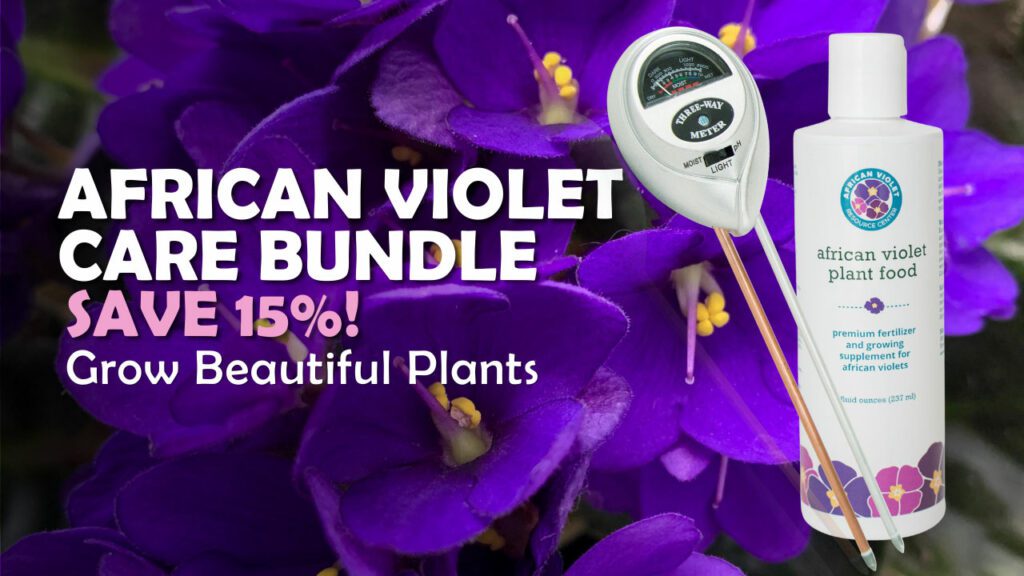The prolific and regular bloom of African violets is one of the many reasons houseplant enthusiasts love them. However, despite their reputation for being low-maintenance plants, there are times when even African violets won’t bloom. How to fix this issue depends on the cause of the problem, which can vary from improper care to environmental factors.
Learn why your African violet won’t bloom and how to fix it using my expert houseplant growing tips.
Why Won’t My African Violet Bloom?


Reason 1: Not enough sunlight.


All plants need sunlight to thrive, and the African violet needs a lot more than most. Without 12 to 16 hours of bright, indirect sunlight daily, the houseplants may not have enough energy to create and sustain blooms. Common signs of this issue include leggy growth, yellowing leaves, and a general lack of vigor.
Reason 2: Inconsistent watering routine.
It’s a delicate balance trying to keep the soil of an African violet evenly moist. Too much water and the roots may rot; not enough, and they will wilt. Both scenarios can cause your plant to stop blooming or prevent it from starting in the first place. Both over and under-watering signs can be easily identified with the naked eye – look for wilting, yellowing leaves and a generally unhappy looking plant.
Reason 3: Fertilization issues.
African violets require a steady diet of food in order to continue blooming. Many beginner growers make the mistake of over-fertilizing the plants, leading to excess salts in the soil that will eventually kill it. On the other hand, not fertilizing at all deprives the plant of necessary nutrients, leading to weak and underdeveloped blooms.
Reason 4: Wrong pot size.


The African violet likes to be root-bound in a small pot. If you’ve planted it in a pot too big for its root system, it may use all of its energy to grow new roots instead of blooms. On the other hand, if the pot is too small, the lack of space can restrict growth and prevent new blooms. You can tell that the pot is the issue if you see roots growing out of the drainage holes or if the plant is top-heavy.
Reason 5: Extreme temperatures.
One of the reasons why African violets thrive indoors is because they prefer a stable temperature between 65-85°F (18-29°C). If the room or location where you keep your plant experiences extreme fluctuations in temperature, it may disrupt its blooming cycle. This can also happen if the plant is near drafts or heating/cooling vents. Common signs that temperature is the issue include stunted growth, brown or wilted leaves, drooping, and, of course, a lack of blooms.
Reason 6: Low humidity levels.
The native environment of African violets is humid, and they need at least 80% humidity to thrive and bloom. In dry, indoor environments, especially during winter when heaters are running, the plant may not have enough moisture in the air to produce blooms. Conversely, too humid environments may cause root or crown rot that will prevent blooming. To check if humidity is the issue, look for dry or crispy leaves, wilting blooms, and black or mushy roots.
How To Fix an African Violet That Won’t Bloom
Solution 1: Reposition your plant for better sunlight exposure.
There is no better solution for insufficient sunlight issues than repositioning your African violet in a place that gets 12 to 16 hours of bright, indirect sunlight. Ideal spots in the home or garden include:
- a west/east-facing window in the winter
- a north/south-facing window in the summer
- the kitchen window, as long as it doesn’t get direct sunlight
- under grow lights for artificial light supplementation
Remember that the amount and intensity of sunlight needed may vary depending on your location and season, so always observe how your plant responds to its new position and adjust accordingly.
Solution 2: Keep a consistent watering routine.


To avoid under or over-watering your African violet, only give it a drink when the top inch of soil feels dry to the touch. Use room temperature water and pour it directly onto the soil, avoiding getting any on the leaves or crown of the plant. Using a watering can with a long, narrow spout is also helpful for more precise watering.
Solution 3: Feed your plant regularly and in moderation.


African violets have specific nutritional needs, so it’s best to use a specialty plant fertilizer specifically formulated for them. The ideal African violet plant food will have a balanced nitrogen, phosphorus, and potassium ratio. Feed your plant every 2 to 3 weeks during the growing season (spring and summer) and reduce to once a month during fall and winter.
Solution 4: Repot your African violet in a suitable pot.
If your African violet won’t bloom because of a pot issue, it’s best to repot it in a size-appropriate container with well-draining soil. Picking the right pot has its own set of rules, but generally speaking, for an African violet that is 6 inches tall, it’s good to use a pot with a 4-5 inches diameter.
Solution 5: Maintain a stable temperature.
Maintaining the ideal temperature range that makes African violets bloom is critical. Keep your plant away from drafty areas and heating/cooling vents that can cause sudden changes in temperature. I find the most consistently warm areas in a home are the kitchen, laundry room, and bathroom. But, if you have a sunroom or heated greenhouse, moving your plant there might be even better to help it bloom again.
Solution 6: Increase humidity levels.
The best way to increase humidity for your African violet is to group it with other plants, place a tray of water and pebbles under it, or use a humidifier. Misting the leaves can also help, but avoid getting the crown of the plant wet, as this can lead to rot.
How To Prevent Future African Violet Bloom Issues


Following any of the solutions above for when your African violet won’t bloom is a great way to help revive your plant and enjoy its stunning flowers. But there are also steps you can take to prevent future bloom issues altogether:
- Take time every day to check on your plant’s soil moisture, light exposure, and overall health.
- Keep a consistent watering and fertilizing schedule throughout the year.
- Rotate your plant periodically for even sunlight distribution.
- Repot your African violet every 6-12 months, depending on its growth rate, to ensure it has enough space for proper root development.
- Monitor temperature and humidity levels in your home and make adjustments as needed.
By using specialty African violet care products and following these preventative tips, you can be sure your plant will have the best chance of producing beautiful blooms year-round.
African Violet Won’t Bloom? Worry No More!
If your African violet won’t bloom, don’t worry! It just needs a little extra care and attention. With these easy solutions and preventive tips, you can help your plant thrive and enjoy its vibrant flowers for many years to come. Happy growing!
Don’t fall behind on your journey to becoming a houseplant whisperer. Sign up for our newsletter to master the latest tips and tricks to make your indoor garden look its best!





